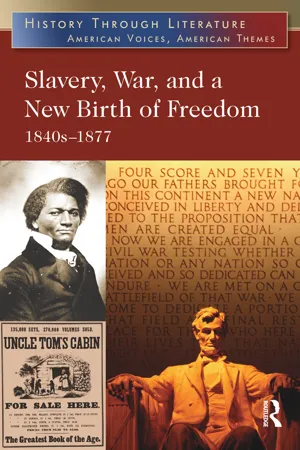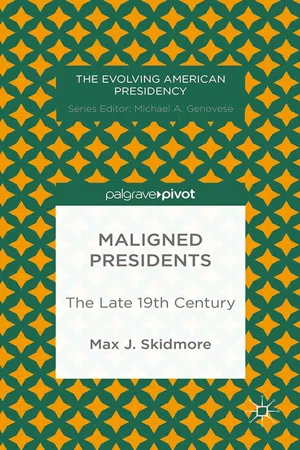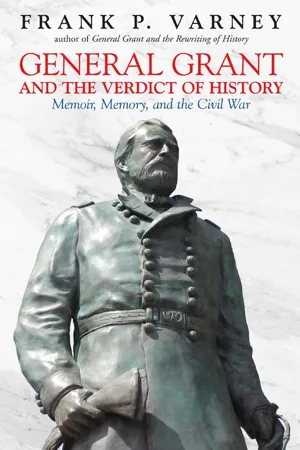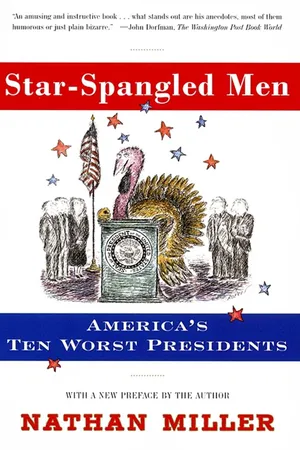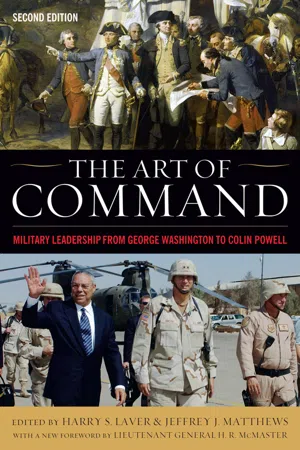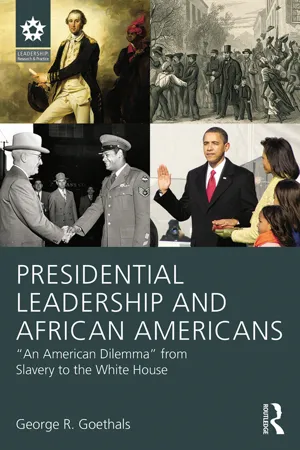History
Ulysses S. Grant
Ulysses S. Grant was an American general and politician who served as the 18th President of the United States from 1869 to 1877. He played a key role in the Union Army's victory over the Confederacy during the American Civil War and was known for his military strategy and leadership.
Written by Perlego with AI-assistance
Related key terms
1 of 5
9 Key excerpts on "Ulysses S. Grant"
- eBook - ePub
Slavery, War, and a New Birth of Freedom
1840s-1877
- Jeffrey H. Hacker(Author)
- 2014(Publication Date)
- Routledge(Publisher)
Grant, Ulysses S. (1822–1885)As commanding general of Union forces during the Civil War and two-term president of the United States during Reconstruction, Ulysses S. Grant was one of the dominant figures in mid-nineteenth-century American history He is esteemed in literary circles for his two-volume autobiography, the Personal Memoirs of Ulysses S. Grant (1885), which publisher Mark Twain called "the best of any general's since Caesar."Born Hiram Ulysses Grant on April 27, 1822, to tanner Jesse Root Grant and Hannah Simpson Grant in Point Pleasant, Ohio, he grew up on a farm in Brown County along the Ohio River. Despite being an unexceptional student, he won nomination at age 17 to the U.S. Military at West Point from his congressman, who incorrectly transcribed his name on the appointment papers as Ulysses Simpson Grant. He decided not to correct it but became known around the Academy as “Sam.”Military Career
Grant graduated from West Point in 1843, ranking in the middle of his class, and served with distinction under Generals Zachary Taylor and Winfield Scott in the Mexican-American War (1846–1848). Fighting in Mexico, he earned respect for his expert horsemanship and for two acts of bravery under fire, including the rescue of a fallen comrade.Assigned to garrison duty after the war, Grant married Julia Boggs Dent, the sister of a West Point classmate, on August 22, 1848; she would become the mother of their daughter and three sons. Transferred to Washington Territory in 1853 and then to Fort Humboldt, California, he served on the West Coast for two years without Julia because his pay could not support a family. At age 32, Grant resigned his commission and returned to civilian life in St. Louis, Missouri. He sold real estate, collected customs duties, worked as county engineer, and then sold harnesses and saddles with his younger brothers, Orvil and Simpson, at a leather shop in Galena, Illinois. - eBook - ePub
- James Daley(Author)
- 2016(Publication Date)
- Dover Publications(Publisher)
Ulysses S. Grant (1822–1885) by Rev. Henry Ward Beecher (1885)Ulysses S. Grant was a statesman and military leader who served as general and commander of the Union armies during the American Civil War, before going on to become the nation’s 18th President. The following eulogy was delivered by noted abolitionist and Congregational Clergyman Henry Ward Beecher at Boston’s Tremont Temple on October 22, 1885.ANOTHER NAME is added to the roll of those whom the world will not willingly let die. A few years since storm-clouds filled his heaven, and obloquy, slander and bitter lies rained down upon him.The clouds are all blown away, under a serene sky he laid down his life, and the Nation wept. The path to his tomb is worn by the feet of innumerable pilgrims. The mildewed lips of Slander are silent, and even Criticism hesitates lest some incautious word should mar the history of the modest, gentle magnanimous Warrior.The whole Nation watched his passage through humiliating misfortunes with unfeigned sympathy; the whole world sighed when his life ended! At his burial the unsworded hands of those whom he had fought lifted his bier and bore him to his tomb with love and reverence.Grant made no claim to saintship. He was a man of like passions, and with as marked limitations as other men. Nothing could be more distasteful to his honest, modest soul while living, and nothing more unbecoming to his memory, than lying exaggerations and fulsome flatteries.Men without faults are apt to be men without force. A round diamond has no brilliancy. Lights and shadows, hills and valleys, give beauty to the landscape. The faults of great and generous natures are often over-ripe goodness, or the shadows which their virtues cast. - eBook - ePub
Maligned Presidents: The Late 19th Century
The Late 19th Century
- M. Skidmore(Author)
- 2014(Publication Date)
- Palgrave Pivot(Publisher)
3Brooks Simpson’s studies of Grant’s administration also make it plain that Grant was politically shrewd, and that he was as effective in office as anyone likely could have been under the circumstances.4 Joan Waugh makes a similar case for Grant, using quite a different approach.5Her unique study uses commemorations of Grant to delve deeply into his extraordinary reputation among his contemporaries. She then explains how, after decades, it came to be eroded. She conceded that his political career was troubled, and that his administration “was plagued by corruption and bungling,” but describes how “his star” still shone “so brightly for Americans of his own day,” yet since has been “eclipsed so completely for Americans since at least the mid-twentieth century.” Her two arguments are first, that “Ulysses S. Grant was a gigantic figure in the nineteenth century,” and second, that “the memory of what he stood for—Union victory—was twisted, diminished, and then largely forgotten.”Waugh’s explanation is as convincing as her indictment is powerful. In the decades following the Civil War, “Grant became the embodiment of the American nation.” He was a “symbol of national identity and memory equal in stature to George Washington and Abraham Lincoln. More than a million and a half people watched his funeral procession in New York City on August 8, 1885, while the dedication of his massive tomb in Manhattan in 1897 drew a similar number.” Nevertheless, “even as the general was praised in lofty speeches at the end-of-the-century dedication,” other forces were at work. “His reputation was subjected to a constant drumbeat of criticism from a small but influential group of ex-Confederate partisans; at the same time, eager reconciliationists from the North began to distort his legacy in pursuit of national unity.” Grant favored national unity, but recognized that a healthy polity “had to be founded on southern acceptance of the victor’s terms.” Grant’s goals were the same as the “premier goal” of the Civil War. That is, “to preserve the American republic and, after 1863, to fight for freedom and the destruction of slavery. To Grant,” Waugh writes with overwhelming force, “those were noble ideals worth fighting for, dying for, and remembering in distinctive ways. Thus his ‘version’ of sectional harmony rejected, indeed found repugnant, the increasingly popular idea that the Union and Confederate causes were ‘separate but equal,’ or even worse, that the two were somehow morally equivalent.”6 - eBook - ePub
General Grant and the Verdict of History
Memoir, Memory, and the Civil War
- Frank P Varney(Author)
- 2023(Publication Date)
- Savas Beatie(Publisher)
C hapter 8Conclusion: General Grant and the Verdict of History
If Grant and Sherman squelch out the rebellion, they will be heroes and we will be forgotten, and sink into oblivion; our past services will go for naught . . . We are conscious of having performed our part well . . . and rendered our best efforts for the salvation of the country and would have continued in our sphere of usefulness had it not been for the petty jealousies of the ignorant and unscrupulously ambitious bad men who sought only their own fame and notoriety.1F or much of the last half of the nineteenth century, Ulysses S. Grant was an enormously important man; much more so than most people—other than historians—realize today. Kenneth Ackerman calls him “the most popular figure in America . . . a national icon” revered at home and abroad, who could hardly go out in public without being cheered, and was one of the most influential political figures in the United States. So when Grant said of a man, as he said of then-President James Garfield, “He is not possessed of the backbone of an angle-worm,” he could do enormous damage. Grant “produced what is today considered perhaps the finest memoir written by a former president . . . At his death in 1885, he was widely considered the greatest American of the nineteenth century.” Since he died within a few weeks of finishing his memoirs, they seized the imagination of the country—in fact, of the English—speaking world—as few memoirs have before or since. And they are still an important starting point for historians of the Civil War—particularly those who study the personalities and abilities of the Union generals.2But Grant wrote his memoirs to leave to posterity the version of history that he wanted remembered. The men Grant didn’t like suffered at his hands, and they have suffered at the hands of historians ever since. There is an old saying that a man can be judged by the number and quality of his friends. But considering a man’s enemies can be enlightening as well. By the time Grant died, quite a few very impressive men had come to dislike—even despise—him. He feuded with and attacked a host of Union generals, including Benjamin Prentiss, William S. Rosecrans, George H. Thomas, Joseph Hooker, Gouverneur K. Warren, John McClernand, George Meade, William F. Smith, C. H. Morgan, Thomas J. Wood, Gordon Granger, Lew Wallace, Winfield Scott Hancock, Andrew Humphreys, Ambrose Burnside, Benjamin Butler, Don Carlos Buell, Henry Halleck, and James H. Wilson, among myriad others. Political enemies abounded as well: Senator John Sherman, brother of Grant’s close friend; Congressman Elihu Washburne, the person most responsible for Grant being reinstated in the army after he had drunk away his career the first time, for helping him become the first lieutenant general in the U. S. army since George Washington, and for leading the charge in Congress to get Grant out of financial difficulty; newspapermen Whitelaw Reid and Donn Piatt; and Presidents James Garfield and Rutherford B. Hayes. And those are just the men who spring quickly to mind, and is a far-from-exhaustive list. Furthermore, Grant’s Memoirs simply ignored the indispensable exertions of his wartime supporters John A. Rawlins, Charles A. Dana, and Elihu Washburn. - eBook - ePub
- Alice Fahs, Joan Waugh, Alice Fahs, Joan Waugh(Authors)
- 2005(Publication Date)
- The University of North Carolina Press(Publisher)
41 White Southerners connected Grant’s brutal generalship with his so-called imposition of Republican rule on the defeated region.Grant, however, connected the war’s goals—reunion and freedom—with an attempt, very imperfect, to make the South a place where black and white, Republican and Democrat could live together. He failed. “There has never been a moment since Lee surrendered,” Grant remarked ruefully, “that I would not have gone more than halfway to meet the Southern people in a spirit of conciliation. But they have never responded to it. They have not forgotten the war.”42Over the next century understanding or appreciation of the Union cause steadily declined against the appeal of Southern nobility and romanticism. Although the Lost Cause ideology has been thoroughly discredited by scholars, it retains a powerful grip on popular imagination, albeit in a less racist form than it took during the last decades of the nineteenth century. The myth of Robert E. Lee is still immensely appealing to large numbers of Americans, and not just Southern Americans. Lee’s brilliant generalship, his stainless character, his old-fashioned and gentlemanly style of warfare, and his noble acceptance of defeat commends him to us.43 In contrast, the warfare conducted by Ulysses S. Grant, the “butcher,” is repellent because it has been deemed modern. In his lifetime and afterward, Grant has been portrayed as having only luck on his side in the western theater and having only the advantage of vast numbers and unlimited resources in the eastern theater. The Southern journalist and Lost Cause historian Edward A. Pollard’s cruel but widely quoted assessment of Grant as “one of the most remarkable accidents of the war . . . a man without any marked ability, certainly without genius, without fortune, without influence” has retained its force over decades of Civil War historiography.44 - No longer available |Learn more
The American President
A Complete History
- Kathryn Moore, Kathryn Moore(Authors)
- 2018(Publication Date)
- Union Square & Co.(Publisher)
10STATE OF THE UNION ★ ★ ★ ★ ★ ★ ★ ★ ★ ★US POPULATION IN 1869 39,818,449 NATIONAL DEBT IN 1877 $2,205,301,392 PRESIDENT’S SALARY $25,000/year; increased to $50,000/year in 1873 STATE ADMITTED TO UNION Colorado, August 1, 1876 NUMBER OF STATES IN 1877 38CIVIL WAR
In the days that followed, Grant helped the good ladies of Galena in procuring material for sewing uniforms and began the laborious process of training the recruits while awaiting his own commission. He escorted the trainees to Springfield and assumed his duty was done, but Governor Richard Yates requested Captain Grant to stay and work in the adjutant-general’s office. His duties there were tedious, but sometimes he was able to get out and aid with the new regiments reporting to Camp Yates. Grant then traveled to the St. Louis area, where his volunteers were to report. Grant visited his in-laws, whom he found to be staunch rebels, and learned that the army, for now, had no place for him. He yearned for a colonelcy in a regiment, but none was forthcoming. He sought out former colleague George B. McClellan, but gave up after cooling his heels for two days waiting to speak with him. Grant’s father again attempted to gain a position for his son, but none resulted.On June 15, Grant was appointed colonel of the Seventh District Regiment in Illinois, replacing an officer who spent a great deal of his time drinking instead of supervising his men properly. A month later the unit left Illinois to rescue another regiment from being taken by rebel forces in Missouri. This would be the Seventh Regiment’s first taste of battle, and their commanding officer was anxious about what lay ahead. His feelings were soon assuaged, however, when he found that the rebels had already abandoned the field. “From that event to the close of the war,” Grant stated, “I never experienced trepidation upon confronting an enemy,”11 - eBook - ePub
Star-Spangled Men
America's Ten Worst Presidents
- Nathan Miller(Author)
- 2008(Publication Date)
- Scribner(Publisher)
* Nevertheless, millions of Americans found comfort in Grant’s political unsophistication. Twice he was elected president and then was almost successful in breaking the two-term tradition.The voters who elected Grant in 1868 were weary of politics. For more than a decade, the nation was torn by civil war and then by the tensions of Reconstruction. The unsavory political scheming surrounding the impeachment of Johnson had aroused genuine disgust. It was a relief at last to get away from the petty politicians and turn to a man already enshrined in a misty Valhalla of tattered battle flags held high and far-off bugle calls. Grant was regarded by the people as a man of decision and integrity, a strong, simple, silent soldier who would bring dignity, efficiency, and reform to Washington. They were to be woefully disappointed.In recent years, some historians have challenged the conventional view of the post—Civil War era as an age of unparalleled corruption.3 They suggest that graft was little worse than usual and contend there was so much talk about it because Grant and others were seriously trying to make improvements. Grant has received such bad press, it is argued, because an extremely articulate band of reformers painted a lurid portrayal of the Gilded Age. Perhaps. But even if these mitigating factors are taken into account, there was still plenty for the reformers to complain about.Yet it would be a mistake to blame everything on Grant. The war had given the North not only victory, but unprecedented power and prosperity. The Southern plantocracy, which had played a key role in running the nation and setting its standards since Thomas Jefferson’s day, was swept away. A new class of men replaced them—pushing, cynical fellows who had made fortunes by selling shoddy goods to the government, by speculating in necessities, and by other schemes in which the public pocket was picked. At war’s end, this crew entered into an alliance with grasping politicians and operated with the same ruthlessness and greed as before. Somehow the “poor man’s fight” of the Civil War had become the rich man’s peace. “Every man at present may be said literally to live by his wits,” observed Edwin L. Godkin, editor of The Nation. “The result is a kind of moral anarchy.”4 - eBook - ePub
The Art of Command
Military Leadership from George Washington to Colin Powell
- Harry S. Laver, Jeffrey J. Matthews, Harry S. Laver, Jeffrey J. Matthews(Authors)
- 2017(Publication Date)
- The University Press of Kentucky(Publisher)
2 Determination and Leadership Ulysses S. Grant Harry S. LaverIn a downpour on 6 April 1862, Brigadier General William Tecumseh Sherman spent the early evening searching for his superior, Major General Ulysses S. Grant, commander of the Union Army of the Tennessee. He found him crouched under a tree with rain dripping from his down-turned hat and a dim lantern providing meager light. “Well, Grant, we’ve had the devil’s own day, haven’t we?” “Yes,” Grant replied. “Lick ’em tomorrow, though.”1Undoubtedly Sherman was taken aback by Grant’s unremitting resolve. The day’s fighting around Shiloh Church had ended with the coming of twilight, but the federals found little comfort in the darkness. The Confederate Army of the Mississippi had surprised the bluecoats with a morning attack, driving back Grant’s farm boy soldiers nearly three miles, to the banks of the Tennessee River. General P. G. T. Beauregard, who took command of the Southern army after General Albert Sidney Johnston died in the thick of the fighting, telegraphed Richmond that Grant and his men were finished, or they would be the following day. Few could have argued with Beauregard. The Union army had lost its cohesion, energy, and spirit, and it teetered on the edge of annihilation. Its fate rested with its commander, who might well have ordered a retreat, as his subordinates, even Sherman, recommended. But Grant decided to fight. His reply to Sherman revealed a tenacity and commitment to press forward. In spite of the day’s setbacks, Grant’s experience confirmed his determination that the next day would bring victory. In that crisis, confronted with overwhelming obstacles, Grant demonstrated perhaps his greatest quality as a leader, what Carl von Clausewitz described as “a great force of will.”2ULYSSES S. GRANT(National Archives, College Park, MD)Grant did not begin his military career armed with an unshakable resolve. His perseverance in war developed from studying the examples of mentors and from learning the hard lessons of experience. During his years in the army, Grant had the good fortune to serve with men like Zachary Taylor and Charles F. Smith, who possessed the drive to succeed and who served as worthy leadership role models. Yet practical, firsthand experience proved Grant’s most effective teacher. With every decision, he gained experience and confidence and developed further into a commander who embodied Clausewitz’s “great force of will.” But make no mistake, Grant’s persistence was not mere stubbornness. A stubborn leader unthinkingly stays the course, failing to recognize the subtleties in strategic, operational, or tactical situations. Major General Ambrose E. Burnside’s repeated, bloody, and failed assaults at Fredericksburg revealed a leader unable to distinguish perseverance from an unreasonable inflexibility. Grant, however, exercised resolve tempered by an eye for the complex and evolving nature of military operations. As his Vicksburg campaign revealed, he was always prepared to adapt, unwilling to allow tactical problems to distract from or overwhelm strategic objectives. - eBook - ePub
Presidential Leadership and African Americans
"An American Dilemma" from Slavery to the White House
- George R. Goethals(Author)
- 2015(Publication Date)
- Routledge(Publisher)
2 Consistent with a lifelong pattern of “fooling away his money,” Grant simply freed William Jones in 1859, even though he could have sold Jones for much-needed funds. Biographers of Grant disagree on a great deal, but they concur that his action in freeing his one slave was a principled one. Some of the efforts that Grant made for African Americans during his presidency have been interpreted by some as motivated merely by political opportunism. As we shall see later, the historical record better supports the theory that his presidential actions on behalf of black Americans, as with freeing Jones, were based on principle.Ulysses S. Grant was the first of six children born to Jesse Root Grant and Hannah Simpson Grant on April 27, 1822. He was called Hiram Ulysses Grant, his classical middle name being given by Hannah’s well-educated stepmother. Grant’s two brothers and three sisters were born between 1825 and 1839. Grant outlived all but his youngest sibling, Mary. The Grant family lived in a small house with a magnificent view of the Ohio River in Point Pleasant, a small community in southeast Ohio, not far from where thirteen-year-old Abraham Lincoln lived downstream in Indiana. Grant’s father owned a tannery. He was ambitious and politically active. His mother cared for her large brood and struck those who knew her as calm, sensible, and somewhat shy.Grant had an unusual gift in handling horses from his very first years, when he seemed to be able to hang on their tails without disturbing them. By age eight he could drive a team of horses hauling wagon loads of wood. By eleven he was plowing fields with teams of horses. He detested the smell of his father’s tannery and shirked work there as much as he could. He and his father finally settled on an arrangement whereby Grant did all the work involving horses. Biographer William McFeely writes that Ulysses, as he was called, saw horses as “wonderfully differentiated individuals,” not just a source of leather. “He could size up each animal that he encountered: master this one’s truculence and urge that one to a feat of strength in hauling rock.”3 From an early age, his touch with horses was not matched by interpersonal or business savvy. He described in his memoirs how his father agreed that he could buy a colt from a Mr. Ralston and instructed him on negotiations. Instead of following the script, he blurted out to Ralston, “Papa says I may offer you twenty dollars for the colt, but if you won’t take that I am to offer twenty-two and a half, and if you won’t take that, I am to give you twenty-five.”4
Index pages curate the most relevant extracts from our library of academic textbooks. They’ve been created using an in-house natural language model (NLM), each adding context and meaning to key research topics.
